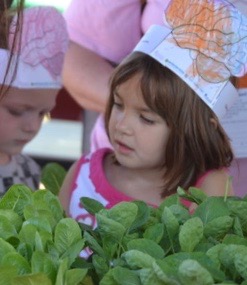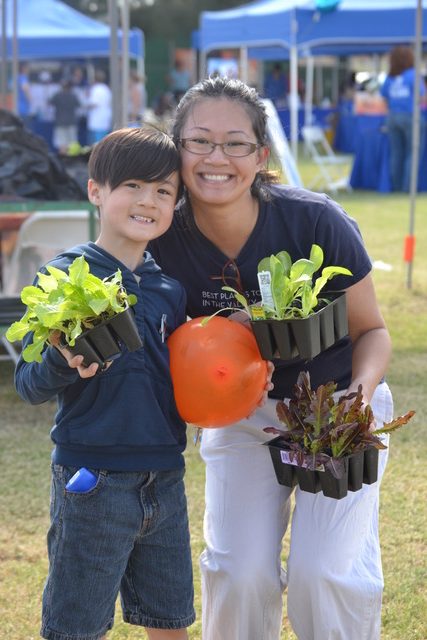Want to grow healthier, smarter, more confident, less stressed children? Plant the seed when they are young through gardening.
Gardening is such an effective teaching tool that Montessori schools often employ it to help students:
- Develop a sense of responsibility
- Build self-confidence
- Expand their curiosity
- Discover more about their senses [ 1 ]
Let’s dig in to see what else gardening can do for kids.


Healthy Kids
Numerous studies – and plain old common-sense – point toward gardening as a means of getting kids to eat healthier. Who doesn’t like to pop a sun warmed strawberry from their own garden into their mouth?
Researchers have found that pairing a school garden program with nutrition education makes kids more likely to prefer and consume more fruits and vegetables. Also, students who helped in the garden rated fruits and vegetables higher on the taste scale. [2]
In the US, a study involving 8- to 11-year-old children found that those involved in a school garden had an increased preference for fruits and vegetables as snacks. A study in the UK discovered that the proportion of kids eating five or more portions of fruits and vegetables increased by 28% after they participated in a school gardening program. [ 3 ]
And, gardening is good exercise, according to Jeff Restuccio, author of Fitness The Dynamic Gardening Way. He says that gardening provides three types of exercise:
- Endurance
- Flexibility
- Strength
Robert Hutchins, MD, from the University of North Carolina, says gardening provides special health benefits for kids. “Early exposure to dirt has been linked to numerous health benefits, from reducing allergies to autoimmune diseases.” And it gives kids a solid dose of Vitamin D, too. [4]
Smarty Plants
Whether kids are in public or private schools or being homeschooled, a garden is a great idea for teaching kids. Gardening provides an opportunity for kids to build reasoning, planning and organizational skills.
A review of multiple studies shows that gardening programs improve academic performance among students who participate. [5]
Plus, teachers report that a garden provides an opportunity to teach kids about science, math, language arts, health and nutrition, as well as social studies and history. [6]
Emotional Growth
Gardening is a tool for emotional growth, as well. UNC’s Dr. Hutchins says gardening:
- Builds self-esteem
- Reduces stress, and symptoms of depression and anxiety
- Makes you happy
Finally, gardening can help you learn to accept things as they are, not as you wish them to be. Psychologist Seth J. Gillihan says, “I learned to practice acceptance in my own garden when the first baby lettuces were ready for harvest. When my 4- and 8-year-old daughters asked if they could help harvest the lettuce, I was less than enthusiastic. What if they messed up my carefully planted garden? I realized that a perfect garden could wind up being a pretty lonely place.” [7]
So, plant the seeds today for your child’s mental, physical, and emotional growth.
REFERENCES
[1] https://www.montessorinature.com/importance-benefits-gardening-children-toddlers-preschoolers/
[2] https://healthy-food-choices-in-schools.extension.org/school-gardens-promote-healthier-eating-
and-better-learning/
[3] https://www.farmtocafeteriacanada.ca/wp-
content/uploads/2014/06/GrowingHealth_BenefitsReport.pdf
[4] https://healthtalk.unchealthcare.org/health-benefits-of-gardening/
[5] https://mk0rodaleinstitydwux.kinstacdn.com/wp-content/uploads/Reasons-to-Garden-School-
Gardens-Improve-Academic-Performance.pdf
[6] https://www.cpp.edu/~smemerson/business318/articles101/childrens%20gardens.pdf
[7] https://www.psychologytoday.com/us/blog/think-act-be/201906/10-mental-health-benefits-
gardening
